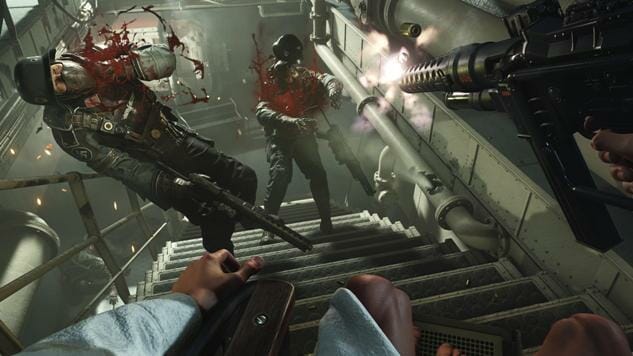Wolfenstein II Masterfully Blends Action and Story

Can a videogame ever make a person change their mind? That’s the question on my heart with the debut of Wolfenstein II. When the reboot originally came out, the idea of killing Nazis in fiction was almost laughably trite. Three years later, as coincidence and tragedy have completely reshaped America’s political dialogue, it comes off as defiant. As I so often ask, is a game defined by its mechanics, its narrative, or both? Wolfenstein II is more than its action, but also more than its ideology. The combination of the two provides the potential for casual indoctrination, an unavoidable side effect that, wielded properly, can be redirected towards the greater good. With that in mind, is the anti-Nazi backdrop of Wolfenstein II just a shock value set piece? Or is its willingness to defy fascism enough to inform a person’s perspective?
Nazi shooting aside, perhaps the most enjoyable aspect of Wolfenstein II is its simplicity. Today’s first person shooters are all but bogged down by overstimulating user interfaces that distract from the experience. Wolfenstein II, keeping intact its legacy as one of the first proper shooting games, is almost minimalist by comparison, lacking the laborious menus and inventory systems of its peers. Instead it encourages forward momentum and continually rewards the player for tackling conflict head-on and at high speed, primarily by scattering pick-up items around the map and avoiding any permanent character upgrades. If you want to stay alive in Wolfenstein II, you better keep moving.
This is not to say that the game’s stealth elements go underused or ignored. Available as an alternative option to solving certain problems and combat scenarios, it too is understated and generally unsaddled with the many tweaks and innovations made to its genre in the past two decades. While the stealth enthusiast in me almost wishes the systems were fleshed out a little more, at the same time, the added complication would ruin the game’s rhythm, so it’s a sacrifice I can accept. Whatever method used to tackle a mission, the ensuing rush is completely satisfying.
As for the game’s narrative material, I’ve somewhat said my piece on the matter already in a recent essay, but my sentiments about the overall game are similar. Wolfenstein II makes no secret of its hatred for Nazis, and indeed has even embraced this stance as a position to market from. Thus, they’ve extended an invitation to criticize their ideology, or rather, how it is delivered, and whether or not it’s effective. While the game is inarguably on the correct side of the moral issue, it’s still important to talk about the indoctrination potential of videogames, and ask if that responsibility is being handled with care. Wolfenstein II makes some narrative choices that are bold and necessary, not just for videogames but all entertainment mediums, and in that sense it excels. But in the future I’d like to see the developers reconsider the context and framing of some of their cut scenes, and ask themselves if it actually subverts the existing power structures the game’s plot hinges on. Often the characters are treated with a fiendish brutality that is less about evoking sympathy and more about painting a villain to cartoonish extremes. If the developers truly believe that the Nazis are the bad guys, they don’t need to show Frau Engel playing with a bloody human head to make their point. The effort would be better spent making the case for the value of human life—something hard to achieve with a violence that is often voyeuristic, and disrespectful to the sanctity or significance of key characters’ (like Caroline’s) lives.
That being said, I have to praise them for some of the smaller details of the game. It is a daring choice in this day and age to, say, feature a breastfeeding scene, or openly challenge white supremacist patriarchy. In fact, I’m almost shocked that they not only wrote in the Black Panthers but also made their leader, Grace, a woman. And I think it’s always a positive thing when a strong male lead character is shown to have a rich inner life exploring his emotional vulnerability. Though sentimental, bordering on melancholic, B.J.s turmoil over Caroline, and his wife, make him seem delicate, at times fragile. While a few scenes related to BJ’s backstory are heavy handed, perhaps even manipulative, others show a restraint that somewhat softens the game’s harder edges, while adequately providing a thoughtful explanation for his character’s perspective. The game makes a rough first impression, but improves as it wears on.
-

-

-

-

-

-

-

-

-

-

-

-

-

-

-

-

-

-

-

-

-

-

-

-

-

-

-

-

-

-

-

-

-

-

-

-

-

-

-

-








































